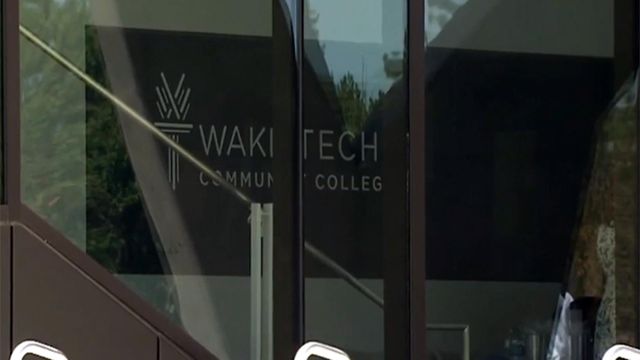Coronavirus throws curveball to NC community colleges, students
When the economy falters, community college enrollment normally rises as people seek to retrain for better employment opportunities. That hasn't happened during the pandemic.
Posted — UpdatedAfter recession hit in 2008, for example, Wake Technical Community College President Scott Ralls said the impact was immediate and long-lasting.
"For about a three-year period, our enrollment grew by about 28 percent," Ralls said.
While the pandemic hasn’t caused the economy to collapse, many people are still struggling. In true 2020 fashion, the "normal" response to uncertain times is out the window.
Nationally, community college enrollment is down 9.5 percent this year. Wake Tech fared better, with only a 1.3 percent decline this fall, although that doesn't account for the drop in classes students are taking.
But first-year student enrollment is off 18.9 percent nationally, and freshmen students of color were hit disproportionately, down by closer to 30 percent.
"This is an event that’s bigger than an economic event," Ralls said.
"I’ll be honest, I didn’t have any money. I felt impoverished," said Emerald Owens, who works a full- and a part-time job and attends Wake Tech online.
Owens lost both jobs at the start of the pandemic and almost joined the statistic for dropping enrollment.
"I felt like I’d worked so hard, I’d given it my all, and where is it going to go?," she lamented. "Down the drain? You know, what am I going to do? Do I quit? Do I give up?"
"We have many more students who are parents, and so now, they’re also teachers at home because their kids have been at home at different times," Ralls said.
So many Wake Tech students are trying to juggle so many responsibilities, he said, that school can be tough even if they can afford it.
"So, they’ve had to kind of play that role. It increases their caretaking role, the work challenges and all adds up, and they’re less likely to go to college that year," he said.
Despite plenty of uncertainty, Owens didn’t give up, but she couldn’t do it alone.
"Don’t be afraid to ask for help. Strong people ask for help," she said.
Her request paid off. After tapping CARES Act funding and other sources, Wake Tech delivered with assistance for Owens' rent, utilities and food until her unemployment benefits kicked in. She says the aid saved her dream of earning a degree toward a career in mental health counseling and social work.
"Thinking about that just brings tears to my eyes because Wake Tech was there," she said.
Community colleges offer plenty of higher education flexibility for people, but Ralls said he worries about the long-term impact the pandemic might have on prospective students.
"If it causes them to take the wind out of their sails, to not try what they would have done otherwise, then it’s going to ripple throughout their families and our communities," he said.
Related Topics
• Credits
Copyright 2024 by Capitol Broadcasting Company. All rights reserved. This material may not be published, broadcast, rewritten or redistributed.





